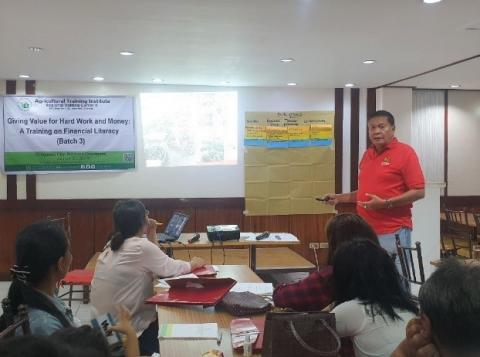Hoyohoy Highland Organic Farm owner and manager Loreto Leo S. Ocampos gives word of advice on the determining factor of one's success. A decided and unwavering mind to succeed through willpower is the strongest predictor of success.
Oroquieta City, Misamis Occidental---As the training and extension arm of the Department of Agriculture (DA), the Agricultural Training Institute (ATI) through its centers is currently conducting series of financial literacy training to the identified provinces in the country where farmers are the top most priority. Such move to shift from support programs focused on production to support programs for easy and low-interest financing is ongoing.
The financial literacy training enables farmer participants to acquire knowledge on business farming. The shift to a market-oriented farming will enable them to learn proper matching and selection of farm technologies and safe farm supplies to reduce crop damages and packaging of fresh and finished farm products acceptable to the market and safe consumption standards for both local and global markets.
For ATI Region X, 30 farmers participated in the 3-day Training on Financial Literacy which was conducted in partnership with Paglaum-MPC, one of the lending conduits accredited by Agricultural Credit Policy Council (ACPC) on July 29-31 2019 at Al-Dannah’s Inn and RestoBar, Oroquieta City, Misamis Occidental.
One of the resource persons was former Misamis Occidental Governor Loreto Leo S. Ocampos who discussed about Filipino values and entrepreneurial mind-setting and also encouraged the participants to start a small business that can lead into a big one.
The series of financial literacy trainings form part of the easy-access loan program of the DA which was initially launched and pilot tested on May 2017 in Surigao del Norte and Nueva Ecija through the ACPC Production Loan Easy Access ( PLEA). Initially, the PLEA program was targeted to cover 15 provinces – one in Luzon, four in Visayas, and 10 in Mindanao. (with reports from Moisa Niña D. Catiil , Hanifah A. Mapandi, and Anthonette June Ruselle)

